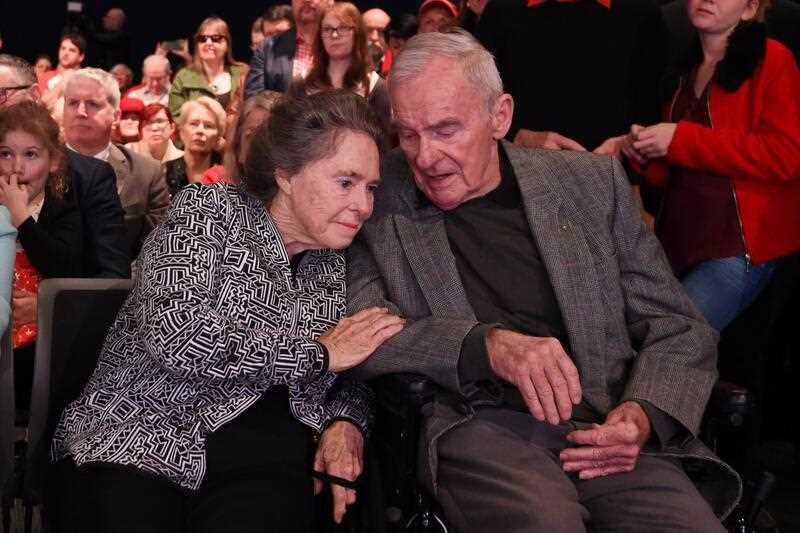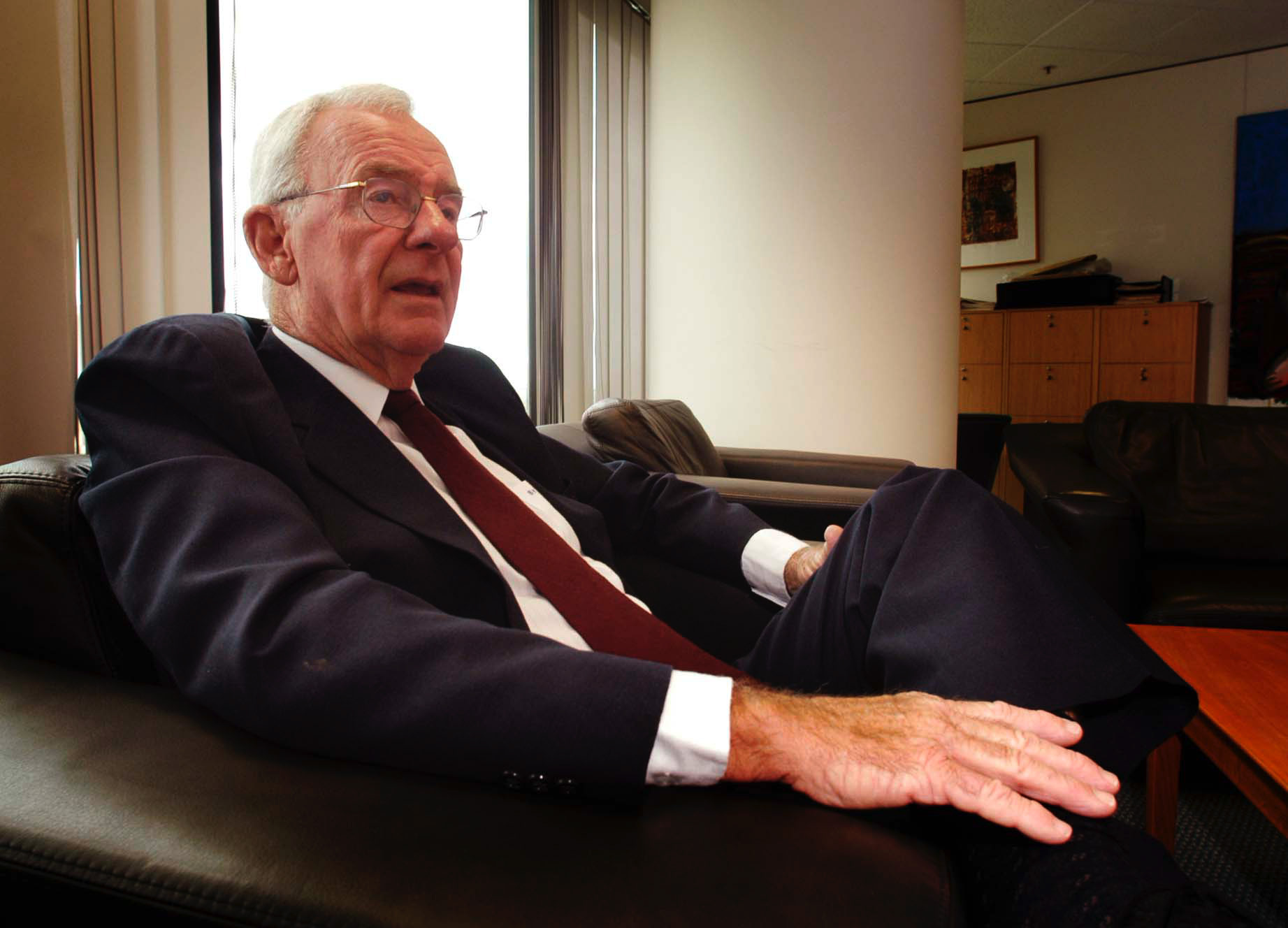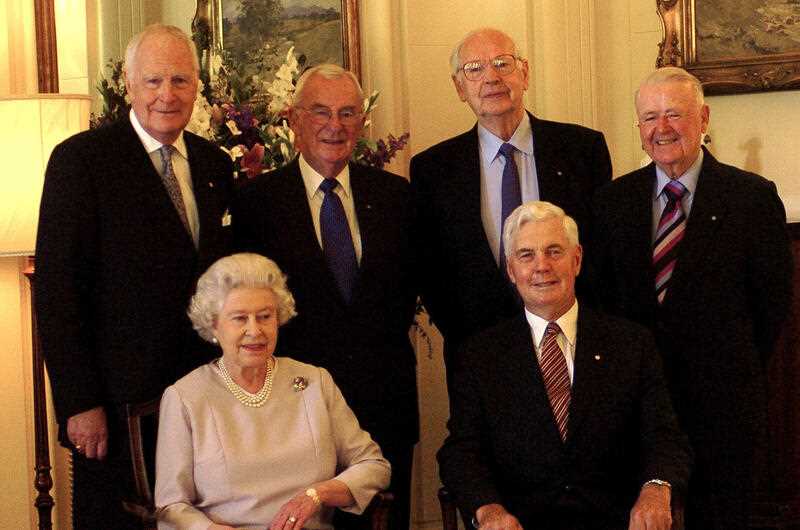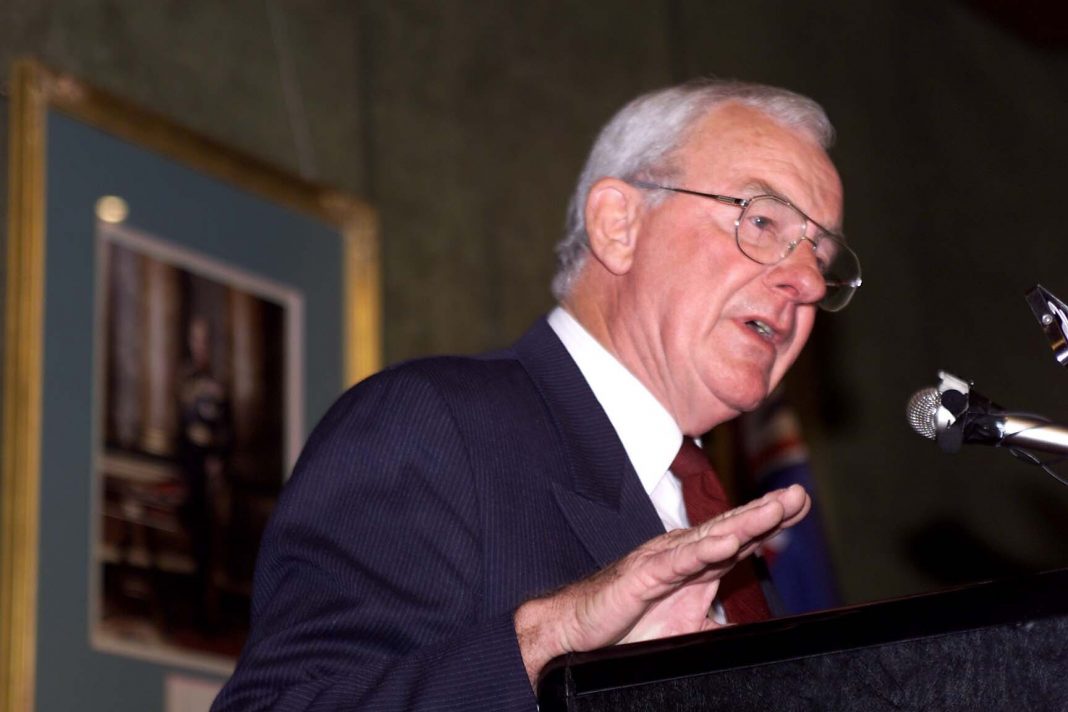Former federal Labor leader and governor-general Bill Hayden is being remembered as a great Australian after he died, aged 90.
Mr Hayden led Labor in opposition from 1977 to 1983 before serving as foreign minister in Bob Hawke’s government.
He had previously served as a minister and briefly as treasurer under Gough Whitlam.
Mr Hayden went on to become Australia’s 21st governor-general, holding the office between 1989 and 1996.
Prime Minister Anthony Albanese said Mr Hayden, who will be farewelled with a state funeral, was a Labor legend who had laid the foundations for the reforms pursued by the Hawke-Keating governments.
“If Bill Hayden left no other legacy than as a key architect of universal healthcare, he would still stand for all time as a legend of our labour movement and a great contributor to our nation,” Mr Albanese said in a statement on Saturday.
“In a time of forceful personalities, Bill Hayden was notable for his humility.
“Yet there was nothing modest about his ambition for Labor or Australia. This was the quiet strength of character he brought to the cause of progress.
“When the story of that generation is told, history should record that without Bill Hayden championing and building Medibank, there could have been no Medicare.
“Without Bill Hayden’s commitment to budget discipline, Bob Hawke and Paul Keating would have found it harder to forge ahead with economic reform.”
Former prime minister Paul Keating described Mr Hayden as “a great servant of Australia”.
“Political circumstances denied Bill Hayden the prime ministership but the Hawke government in which he served as foreign minister was set up and shaped by him as leader of the parliamentary Labor Party,” Mr Keating said.
“And the economic personnel he put in place were the building blocks the Hawke government relied upon to shift the country’s policy to the economic rationalism which has since made Australia so flexible and so wealthy.
“Very few Australians have made such a contribution over such a long period. The country is the poorer for his passing.”
Mr Hayden is survived by his wife Dallas and three children.
Obituary: Labor legend Hayden’s journey from battler to viceroy
Bill Hayden held many of the most important positions in Australian public life – senior minister, Labor leader, governor-general.
And he may have missed out on the most important of all – prime minister – by a matter of hours.
His many years in politics was the public side of huge personal journeys – from Catholic battler to atheist head of state, from socialist to qualified defender of the monarchy. And finally, in 2018, he returned to Catholicism.
Yet despite his achievements and abilities, which enabled him to be the crucial bridge between Labor titans Gough Whitlam and Bob Hawke, he lacked the certainty in his own ability that is a hallmark of most successful leaders.
Maybe it was his harsh childhood, perhaps the tragedy of losing a young daughter, but he was a reluctant leader and, when he was fighting for his political life, he seemed hampered by self-doubt.
William George Hayden, who has died at the age of 90, was born on January 23, 1933.
His father George was an Irish-American who ran away from a seminary, became a merchant seaman and jumped ship in Brisbane.
The Great Depression cost him his modest piano tuning business and left him an embittered, violent and hard-drinking man.
The young Hayden learnt from his father and mother Violet, both staunch Labor supporters, of the cruelties of capitalism.
Life in south Brisbane reinforced those lessons.
Hayden got a very junior and soul-destroying job in the Queensland public service, to which he stuck for three years before joining the police in 1953.
The beat, in Brisbane and later Ipswich, did nothing to mitigate his political views.
In Ipswich he threw himself into self-improvement, studying part-time for his matriculation, and in 1960 married Dallas Broadfoot. They had three daughters and a son.

The eldest, Michaela, was killed by a car in 1966.
Hayden was traumatised. Thirty years later he wrote of nights of emotional torment, days when he doubted his sanity, and of a recurring dream that Michaela was not really dead and one day they’d be reunited.
Hayden won the Ipswich-based seat of Oxley in the 1961 election that almost unseated Robert Menzies.
There was no meteoric rise.
He learnt of the hatreds within Labor – once he and Pat Galvin exchanged haymakers outside Arthur Calwell’s office.
He learnt that the Australian people would not rise up in revolt against the Vietnam war, to which he was passionately opposed.
He also discovered that Menzies was no satanic figure.
However much of his time was taken up with doing an economics degree.
Hayden admitted that he went into parliament with an oversized social chip on his shoulder and that, early on, he was no great admirer of the patrician Whitlam.
But he was converted by the force of his arguments and ideas and his profound humanism.
He came to believe Whitlam – however shambolic his government became – was the saviour of Labor.
In 1969, Whitlam won 17 seats, four short of government, and Hayden finished his degree and began his ascent.
Although steering clear of the factions, he ran equal second in the caucus ballot for shadow cabinet.
To his disappointment, Whitlam gave him health and welfare. It was a prescient appointment.
As social security minister after Labor came to power in 1972, he was the architect of Medibank, the precursor to Medicare.
It was a colossal achievement, in the teeth of savage and personally wounding opposition from the Australian Medical Association and obstruction from the non-Labor states.
In 1975 he became treasurer and, in his only budget, cut back on government spending.
By then it was too late. Malcolm Fraser blocked supply in the Senate, precipitating the crisis that Governor-General Sir John Kerr resolved by sacking Whitlam and appointing Fraser as caretaker prime minister ahead of an election.
Alone of the major Labor figures of the time, Hayden came – with the benefit of his own vice-regal experience – to be a qualified supporter of Kerr’s action.
He said in his memoir that if he’d been in Kerr’s position he would have acted, though at a later point, in much the same way.
The day after the 1975 election, with Labor slaughtered, Hayden rejected Whitlam’s overture that he take over the leadership. At that point he didn’t know if he’d held his own seat. He did, though he was the only Queensland MP to survive the carnage.
In 1977 he did stand for the leadership, though half-heartedly and without trying to organise numbers. Whitlam survived by a mere two votes.
When, later that year, Whitlam again lost heavily, Hayden took over as leader. He admitted that he took the job with misgivings. He was a worrier with no faith in his own infallibility.

Moreover, he lacked a factional base and was never fully at ease with the media.
However, he worked hard to convince the electorate that the adventures and excesses of the Whitlam era were over and Labor now was economically responsible.
In the 1980 election, Fraser’s majority was more than halved and Labor was less than one per cent from office. The government also lost control of the Senate.
But the election brought Bob Hawke into parliament and the former ACTU leader, probably the most popular political figure in Australia, was not waiting.
Hayden was white-anted almost from the start. Hawke had the opinion polls and the right; Hayden an amorphous centre and the left, which was motivated more by its dislike of the pretender than its enthusiasm for the leader. Its support started to splinter over uranium policy.
Hawke also had his old ACTU mates, who sabotaged Hayden’s efforts to achieve a wages accord as the linchpin of his economic policy.
Hayden, in a pre-emptive strike, called a leadership ballot in July 1982. He won by only five votes.
The Flinders by-election that December, when Labor gained the tiniest of swings, sealed his fate. That persuaded most of caucus that only Hawke could guarantee victory.
As Hayden later admitted, by then he was physically and mentally exhausted and personally demoralised.
It was John Button, the factionally unaligned Senate leader and one of Hayden’s closest allies, who finally persuaded him to go.
On February 3 1983 Hayden resigned. The same day Fraser, believing he could beat Hayden but not Hawke, called an election. Five weeks later, Hawke won easily. But would Labor have changed leaders if the election was already underway?
At his resignation news conference, Hayden said a drover’s dog could win the election, a parting gibe that always annoyed Hawke.
Neal Blewett, a senior Hawke minister, believes Hayden probably would have won, though not as decisively.
As part of his resignation deal, Hayden became foreign minister, a position he held for nearly six years.
Although Hawke was also an activist in foreign affairs – and also more pro-American and pro-Israel than Hayden – the two worked well together.
Despite strong early American opposition, they started work on a Cambodian settlement, though most of the slog was done after Gareth Evans took over as foreign minister.
Hayden threw himself into disarmament, though he went too far for Hawke when he tried to make the joint facilities a bargaining chip in his efforts to get US support.

In early 1987, according to Hawke’s memoir, Hayden asked for the governor-generalship, which he felt would remove his sense that he’d been judged unfit for the highest office.
Hawke, who knew he’d caused him acute pain, agreed immediately. It was Hawke’s atonement.
Hayden took over at Yarralumla in February 1989. The appointment inevitably attracted criticism, with commentators dredging up old Hayden comments about the office, including one from two years after the Whitlam dismissal: “I don’t believe we need any such position.”
He made immediate history by becoming, as an atheist, the first GG to be sworn in by affirmation rather than oath.
Hayden was, when it came to symbols, the most informal of GGs. He refused a knighthood and wouldn’t wear a top hat or insignia of office. He queued at Canberra cinemas like anyone else.
While generally keeping clear of partisan politics, he did dip into controversy, supporting euthanasia, same sex marriage and the right of gay couples to adopt children.
As the push for a republic accelerated, he annoyed his old Labor colleagues by criticising the Keating government’s prefered model.
When Hayden left office in February 1996, just before John Howard ended the Labor ascendancy, he was a constitutional agnostic who saw no reason to change the status quo.
He said he was neither a militant republican nor a deferential loyalist, adding: “I dare say a republic will come one day, but of its own accord. Let it evolve. We should not waste time and energies trying to force-deliver it.”
With Dallas, he retired to a farm on the edge of Ipswich. He wrote and spoke, but compared with his two immediate predecessors, Ninian Stephen and Zelman Cowen, played little part in public life.
The driven battler from south Brisbane, who’d walked with kings and presidents, at last had nothing more to aspire to or to prove.
By Don Woolford in Canberra



